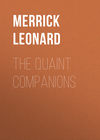Loe raamatut: «The Quaint Companions», lehekülg 7
The slim volume for the publishers grew slowly; some evil power of daylight seemed to freeze the verse that he had left aglow, so often was a night of exultation followed by an evening of dismay. A manuscript of sad surprises. Yet at last it was finished, for even he could find no more to alter.
Then its journeys began, and eventually it found a home; but it was not treated kindly there, and it brought him little recognition, and no money. He had scarcely realised the intensity of his prayers for it till it failed; nor had he known what strength he derived from the hope of fame until the hope sank. With the loss of faith in his work, the feeling of desolation deepened. A passion of revolt possessed him as he looked from the mirror to the future and saw himself perpetually alone. Because his misery cried for expression, he picked up his pen again; but though his interest in his art revived as time went by, the bitterness was always in his soul. Even as the years passed, there grew within him a hatred of his own person – a jealousy of every shop-boy who was kissed by a servant-girl for love.
CHAPTER XI
Professor Sorrenford had five daughters, but only the eldest and the youngest were unmarried; the others had removed to homes of their own. The house, of which the early Victorian furniture was falling to decay, stood in a genteel street in Beckenhampton – one of those streets in which every third household hankers after a "paying guest," and shivers at the proposal of a "boarder." On the door a brass plate announced, in worn lettering, that Professor Sorrenford taught music and elocution, and from time immemorial vain efforts had been made to induce the "generals" to pull down their sleeves before they opened that door.
In the dining-room, which was also the parlour – for the drawing-room was reserved for the reception of pupils in the daytime – a girl was lying on the sofa one afternoon before a fire, that needed poking. Her eyes, grey and luminous, and the fashion in which she coiled her abundant hair, gave to her delicate face a character, a grandeur, which she dissipated when she smiled. Her smile was perhaps a little foolish. When her mouth was in repose she looked a woman to die for; when she smiled she was merely a very pretty girl with a pink-and-white complexion and a dimple in her cheek. She wore a pale blue flannelette dressing-gown with a superfluity of ribbons; and as she was not smiling on the sofa, but stitching the dead body of a sea-gull on to her best hat, she had that air of spiritual reflection which always embarrassed her partners so much until they discovered that there was really nothing to be afraid of. This was Hilda, the Professor's youngest. The eldest had been christened "Hebe," but in deference to her wishes no one ever called her so, nor did she ever write the name. She came in now – bringing the other something in a breakfast-cup – a girl with a curvature of the spine.
She was short. Her shoulders were square, her features drawn, the lips were thin and sensitive; only her eyes denoted to a cursory glance that nature had meant her to be beautiful. The angular deformity of the spine that defeated nature's intention had resulted from an accident when she was barely three: a nursemaid's carelessness for a moment – then for the child, inactive, prostrate, long years of suffering while her sisters played. Her mother died before the torture which the doctor described as "rest" had worn to an end, and – as the pastimes of the other girls were denied to her – it was Hebe who came gradually to fill the mother's place: to withhold the bills that would worry the Professor, and to order fish for dinner when the butcher's foot was down. It was her part to cut the sandwiches when the other girls went skating, and to stop behind and devise "high teas" for their return. It was her part, by-and-by, to screw their frocks out of the housekeeping money when they were asked to dances, and to sit up to look at their programmes when they came back. Later still, it was her part to watch lovers come into three lives in turn, and to contrive three trousseaux, and see three younger sisters wooed and wed.
None of the family remembered any longer that she had not been born to stand aside; there is nothing from which we recover more healthily than the affliction of somebody else; and that she had a woman's heart, and all a woman's natural longings herself, was a fact that her poor exterior obscured – to the perception of other people. When we say that we admire a face, we mean, consciously or not, that we admire some attribute that the face suggests to us, and when the exterior repels we seldom speculate very curiously about the soul. To-day, at the age of twenty-six, she found the addition of the tradesmen's bills less disquieting than formerly, by reason of the reduction of the household; and since she earned a little money by her brush, she was able to sweep a number of thorns from the Professor's path. She was not his favourite daughter, because there were hours in which he found the sight of her deformity depressing, but when he was troubled about the rent he often exclaimed with emotion that he didn't know what he would do without her.
"What have you got in that cup, Bee?"
"Mutton broth," she said; "you didn't eat any dinner. Have you been asleep?"
"No," Hilda complained. "I couldn't; just as I was dropping off, half a dozen doors began to slam. Is there any salt in it?" Her voice was small and high. The first time that one heard it pipe from her queenliness one felt dismayed. One felt as if the grand organ stops had produced the effect of a penny whistle.
Bee nodded, and made up the fire. "It's snowing again," she said. "Why didn't you wait till the spring before you had your influenza? – then you might have gone to the seaside afterwards. Doctor Fellowes doesn't think it would do you much good this weather. I met him just now in Market Street, and asked him."
"What did he say?"
"He thought you had better wait till it was warmer and you could sit about more. I went to Tuffington's; I couldn't get any of the books on your list – they haven't had them down, of course. Miss Tuffington said that nobody had asked for them."
Tuffington's was the principal circulating library and bookseller's of Beckenhampton. The proprietor was at present displaying, at three-and-elevenpence-halfpenny, in wadded roan, a line that he had labelled "Tuffington's Series of Padded Poets. Tried, and not found wanting. Specially recommended." It was a rare occurrence to find a recent novel there, however, and he made no reference to padded fiction. Hilda's gesture was more impatient than surprised.
"There were eighteen on that list," she said. "I'm sure I don't know what we subscribe for. I can't keep on reading East Lynne and Jane Eyre all my life. Didn't you bring anything at all?"
"They said they'd try to send you up something to-night before they shut. I could only get the book I'd ordered – the one that's criticised in the Review of Reviews this month."
"Poetry!" She wrinkled her dainty nose. "What sinful waste of money. Where is it? Let's look."
"It's downstairs – I left it in the hall when I went to see about your broth. Shall I fetch it?"
"Yes, do, or father will pick it up, and then he'll elocute it at us all the evening; I'd rather read it myself than that. Who's in the drawing-room?"
"Nobody. It's Thursday, you know – father's afternoon at Great Hunby. I was going to send in a steak for his supper, but Rose always burns them so; the last we had came up a cinder. I really don't know what to get."
"As the dinner was raw, she's quite sure to burn the supper. Why don't you make him an omelette?"
"He likes something substantial when he comes back," said Bee thoughtfully. "Perhaps eggs and bacon – "
"Eggs and bacon are so soon over," objected Hilda; "and, besides, if they aren't broiling hot —I know! Get him a Perrin's pork-pie."
Bee brightened. Its pride in its pork-pies is a cult in Beckenhampton – they obsess the local mind – but there are pies and pies, and Perrin's are the pinnacle. If the King were to consent to sup in a Beckenhampton ménage, the breathless question, "What shall we give him?" would be disposed of when someone exclaimed, "Give him a Perrin's pork-pie."
"That's it," she said. "I'll tell Rose to run out now. I don't know what I was about not to think of it – I might have brought one in with me."
She went downstairs again promptly, and, when she returned, the book that she had bought was in her hands. This had not, as had Rossetti and Tennyson and the others in the "line," the cachet of Mr. Tuffington's "special recommendation"; it was a mere work that he did not stock. She gave it to her sister, and lit the gas.
"There you are," she smiled; "it will be something to go on with, though it is poetry."
"Anything is livelier than the advertisement sheets of the newspaper," said Hilda, unwrapping it, "if you're sure you don't want it yourself. I'm so dull I could read Shakespeare. What a hideous cover! 'A Celibate's Love Songs – by David Lee.' Why did you order it; is he anybody? He only seems to have written one thing before."
"The Review of Reviews said he had genius," answered Bee, "and parts of the criticism made me think I should like it. No, you can be quite comfortable with it; I'll wait till they send up your novel."
She pushed an armchair to the hearth and sat down as if she were tired. She was, as she had said, in no hurry for the book, though she had been eager to read it a week ago; her mind was full of other thoughts this afternoon, now that she was free to think them. There was the picture that she was unable to begin; it floated through her brain, elusive and incongruent. She had been so pleased last week when she came back from Elphick's farm, but the more she pondered over the photographs that she had taken there, the more she was perplexed. It was that barn with the lichened roof that threw her out. Such colour! She couldn't bring herself to forget the barn; yet, if she didn't, the picture would be quite different from the one she proposed to paint. Her camera was always leading her into temptation, she reflected. She had bought it to see how her subjects composed, and to photograph the trunks and branches of trees, in order to study their form at her leisure; but since she had had it she was constantly preparing disappointments for herself, constantly happening on the impracticable. She stared into the fire, her elbows on her lap. Her gaze was wide while she was wondering; then her lids drooped low, and lower, as on the blank canvas of her mental view there grew laboriously a conception. Her chin was raised, and mechanically her thumb made little downward movements in the air.
The silence lasted perhaps a quarter of an hour; it was broken by the younger girl. She turned on the sofa petulantly: "Read to me, Bee, there's a dear!" she exclaimed. "My eyes ache, and the light makes them worse."
"I thought you hated being read to?" said Bee, starting, and hoping that the start wasn't noticed, because it would be considered affectation.
"Not by you; it's elocution lessons in disguise that get on my nerves. Do go on – it's very pretty here and there."
Bee took the book reluctantly, and began to read by an effort. For an instant the fact that she had been curious about it was dormant in her mind, but almost immediately she remembered, and the cause of her curiosity – the expectation of finding in the poetry just the passionate protest that was in her own heart – brought a little eagerness into her voice. Very soon she came to some lines that had been quoted in the review. She read them twice – once to Hilda, and once to herself; and again she thanked the man for saying that.
"It's rather nice, isn't it?" Hilda commented, as she paused.
"Yes," she said, "it's rather 'nice.'"
But she held the book before her face as she went on. The man revealed her secrets – told all that she felt every day of her life – and she was afraid that Hilda must know it, though Hilda didn't. Her mind and spirit responded vehemently to his verse. He was voicing her soul, uttering the emotions which nature woke in her, and which she had never been taught to express in her art; he cried aloud thoughts that she had nursed in bitterness, and thoughts that she had shrunk from, too cowardly to own. Once she questioned if the poet was a man at all. Wasn't it the outcry of a woman, hungry and resentful like herself, only gifted with the power to interpret, and the courage to avow?
She questioned only for a minute; man's deification of woman's beauty, a man's illusions about women, thrilled through the verse too strongly for her to be deceived; but a deep interest in his personality mingled with her gratitude for his work. It was a keener interest than had been stirred in her by any other pen; she even fancied that she must understand him better than any other of his readers. She would have given much to hear him talk, and though it was impossible – though she knew that few things were more unlikely than that she would ever meet him – she winced in reflecting that the very deformity which intensified her appreciation of his genius would make her appreciation a still poorer thing in his regard.
She was not reading now. The present pause had lasted so long that the fear that Hilda must divine spurred her to the next line guiltily, and she glanced across at Hilda as she read it; but Hilda was asleep. She was glad. She did not want to read any more just yet, or rather she did not want to read any further. She wanted to turn back, and read some of the stanzas again. There was the page that had brought before her eyes so vividly a view of the Little Tester churchyard from the hill. It had made her wonder if he had ever been there when the poplars were blackening against the sky, and all was vague suggestion but the lamplit windows of the cottagers, and the ghostly gravestones of their dead. She had often meant to paint an impression there, and when she had found the page, the desire to do so flamed in her again, fiercer for her admiration of the verse.
If she could have expressed the feelings that the scene aroused in her, the woman would have been a great painter, for she felt deeply and originally, in spite of the local art-school where the tuition – as in almost every English art-school – tended to crush the instinctive feeling of the students. Her brush had provided her only happiness, just as the school – where she had begun to study when she was about fifteen – had provided her only training, but she paid for the hours of happiness with days of dumb despair. She could not stand before this or any other scene, and express clearly what it meant to her, and, baffled, she knew it. She painted very pretty pictures of average merit, poetical things with considerable charm, but further she could not go. She felt that her pictures lied about her almost as basely as her body lied. She tried to believe that they maligned her because she was still young; she reminded herself often that the greatest of our landscape painters had not accomplished the work that made them famous until they were nearly forty – in Constable's case not till later. She did not know that her stumbling-block was that while she had heard a great deal about the virtues of Rossetti, and Burne-Jones, and Ford Madox Brown, a great deal about the eighteenth-century masterpieces and the technique of Reynolds, and Gainsborough, and Romney, she had heard nothing at all about the virtue of going to Nature direct for her impressions – had never been told that her own likings were as valuable as Rembrandt's, or Velazquez', if she would only set them down with sufficient sincerity and courage.
She was one of many – one of the crowd of artists possessing a certain amount of talent and individuality – who are born in England, but whom England cannot teach. And for lack of the guidance that is not to be had in their own country they are for ever stultifying themselves, instead of doing what was promised by their natural gifts. They learn to imitate the work of the painter who has scored the biggest success of the year; to try to imitate the old masters; to treat deliberately a commonplace subject in a commonplace way, with a view to pleasing the Powers of the Royal Academy. What they do not learn is to stand with an open mind, receptive and emotional, in a scene of the every-day life about them, forgetting all the pictures they have seen, and all the juries, and the ignorance of the British picture-buying public, until they know that the thing they are feeling and wanting to convey isn't a mere memory of the work of someone else, but a true impression of life or nature drawn from their inner selves. If Hebe Sorrenford could have studied in Paris for four or five years, she would have been, a better painter, and a happier woman. But she did not realise it. And, as the Professor could not have spared her, it was perhaps as well that she did not.
The servant entered to lay the supper, the pork-pie crowned by parsley on the dish. She said the master had complained that the beer from the new barrel was thick, and inquired if she should draw some for him, or bring up a bottle of stout. Bee replied that her father would rather have the stout.
He came home soon afterwards, a man with mild manners, and a dejected back, who had written several songs that had never been published, and one song that had been successful – under another composer's name. He had also a sanguine temperament, which had survived the corrections of thirty years. A musician who had never learnt to blow his own trumpet, he had failed for want of audacity; and because he was always eager to persuade himself that it was policy to accept injustice rather than face an unpleasant interview, he was inclined, like most men who yield in the wrong places, to be exacting and consequential at home.
"Worn out, father?"
"Eh?" He bent to their caresses, and sank into a chair.
"Worn out?"
He sighed, stretching his feet for slippers.
Bee brought them to him, and moved the footstool.
"What news?" he asked. "How's the invalid?"
"The invalid has trimmed a hat," Hilda answered. "How did you get on to-day, dear?"
He sighed again. "Young Simpson isn't coming back next term. So much for Simpson!"
"So much the less for us," she said. "Why not?"
"Because he's a curate and puffed with vanity, and I let him choose 'The Charge of the Light Brigade' last lesson and pretended he didn't squeak. He's so highly satisfied with his elocutionary graces that he thinks he has nothing more to learn. That's the worst of the elocution pupils; if you encourage them, they get conceited and give you up; and if you don't encourage them, they get disheartened and give you up. Pupils – " He spread his hands seeking epithets to stigmatise pupils.
"And the Mayor?" said Bee. "It was the Mayor's morning with you, wasn't it?"
"The Mayor, my dear, was, if possible, more hopeless than ever. He talks through his teeth, and as to his finals, you never get even a g. Half the forty minutes go in grammar lessons – not to be mentioned of course. I've been working on his Address with him now for a fortnight, and he still says 'Gentlemen, you was.'"
She laughed. "There's nothing like leather," she said. The Mayor had made his fortune out of boots. "It seems only the other day we used to see his wife scrubbing her doorstep when we went through Hippodrome Place."
"Anyhow his wife carries the position better than he does," Hilda put in. "You might almost take her for a lady if you looked at her in a hurry."
"And if you didn't hear her speak," added the Professor. His gaze wandered to the dish, rested on the pie, and gladdened. "A Perrin's?" he exclaimed. "Good children! I'm hungry." He rubbed his hands, and shuffled to the table. "Let's sit down. Yes," he went on – but he spoke slowly now, because to cut a Perrin's was a rite – "yes, young Simpson is leaving. And Miss Kimber's class – well, you know about Miss Kimber's class! Only seven piano thumpers now, as against twelve at midsummer. If it weren't for the private lessons at the room, it would hardly pay to go over to Great Hunby on Mondays and Thursdays any more. Hilda, my dear, did I give you a piece of the jelly?"
She bent her stately head to see. The grace of her slender figure had been apparent when she moved from the couch, the length of limb. At the mean table, laid with a soiled cloth, she looked a goddess to whom men might offer worship, sacrifices, for the recompense of her regard. To offer her pork-pie seemed a profanation – until she smiled.
"The school advertises your name in The Herald," said Bee. "There's that."
"Yes," he admitted, "there's the ad., and of course it means recommendations to other schools, too. Still the fees are not high, and the little girls are not interesting."
"Wait till the opera is produced!" she said. "It will be taken some day, and then – "
"Ah, yes," echoed Hilda, "wait till the opera is produced! Father conducting, and us – 'we,' which is it? – in a private box. Has any manager got it now, Dad?"
Years ago, so many years ago that they told falsehoods to one another about its age, pretending that the poor dear was less ancient than it was, the man had written a light opera, the librettist being a friend even unluckier than he. By half the theatres in London, and many in the provinces, this opera had been rejected. Its leaves were tattered, and the librettist had long since renounced his pen in favour of auctioneering in the North. But the Professor nursed his illusion still, still wove dreams around his opera over his evening pipe. It was the family fetich. They played its airs, and sang its lyrics, and laughed – still laughed – at the auctioneer's familiar jokes. When their best friends supped with them, the piano was opened and "Father's opera", was the feature of the entertainment. When it happened, as it sometimes did, that the receipt of the discoloured bundle was acknowledged by a curt managerial note, the composer, who had so little to encourage him, was uplifted by that – in fancy felt the baton in his fingers and foretasted all the rapture of his First Night. At such times he paid visits; his eyes twinkled, and his stoop had nearly gone. "They're nibbling, my boy!" he would say. And then again, with a beam and a toss of the head, "The managers are nibbling!" But when it is added that the score was musicianly and the airs were tuneful, and that the rejected work would have been performed long before puns went out of fashion if Sorrenford had only been a well-known name, there remains less humour in the pathos than his acquaintances enjoyed.
The old man looked up from his plate and smiled roguishly.
"It's odd you should mention the opera just now," he said. "Because there's a prospect! I told you all the bad news first, and was keeping that for the end. Wait till we've finished supper, and I will" – he chuckled – "I will a tale unfold!"
They were all eagerness, but they knew his idiosyncrasies too well to demur at the delay. Until the moment arrived which, for no good reason, he had fixed upon to tell his tale, questions would be useless. They exchanged glances, wondering how good the news really was, and recalling past "prospects," that they might not be disappointed when the facts came out.
Presently they rose and went back to the hearth. He filled his pipe carefully, extinguished the spill, and placed it with deliberation on the mantelpiece. Next he made himself comfortable in the only comfortable chair.
"Ha!" he said.
"Well, Dad?"
"Well, my dears, it has been whispered to me – Mind, this is to go no further; you mustn't mention this. I was told in confidence."
"Yes, father, yes? We won't breathe a word."
"Well, I was told in confidence" – he puffed placidly – "that the Theatre Royal is – changing hands!"
They were a little slow. "Changing hands?"
"I'm told that Mobsby is likely to give it up. I hear that in a few months' time the Royal may be run by some other manager – a manager who, one may say without being unduly sanguine, is sure to be more enterprising, for new brooms sweep clean."
"Ah!" said Bee, "you think the opera will have another chance there?"
"Oh, oh!" cried Hilda.
"Think?" His expression was gay, his manner important, there was even a tremor of triumph in his tone. "Think? Don't you see for yourself what it means? My dear, women are very dense in practical matters, really – your poor mother, God bless her, was just the same. Don't you see that it is one of the best things that could have happened for the opera? I'm not sure, I'm not by any means sure, that it isn't quite the best thing. Remember who I am. I'm somebody here; not rich, far from it, but in my way – in the little world of Beckenhampton-a personage. I may say that, I think? – I don't want to flatter myself, but 'in my way, in the little world of Beckenhampton, a personage'?"
"Yes, yes, Dad – a personage; of course you are!"
"Good! So far so good. Well, what follows?" He took three slow whiffs of the pipe again. "The new manager wants to ingratiate himself with the Beckenhampton public. He says to himself, 'I could hardly do a cleverer stroke of business than open my campaign with the work of one of the oldest and most respected of the residents.' It's as good for him to get the opera as for me to give it to him. Our interests are identical; we – so to speak – we link arms!"
They caught a little of his confidence, and affected more.
"But won't the touring companies stand in the way?" they asked.
"Tschut! Let him give it a production, that's all I want – a fortnight, a week, even a night will be enough to make it known. Once it is heard, there will be offers from London. It will get about how the audience received it; the managers will see the criticisms – I shall post them to all the principal theatres myself. I think, I really do think, that the poor opera has got its chance at last!"
He mixed some whisky and water, and dilated on the subject till his daughters' bedtime. At eleven o'clock they kissed him and went upstairs. In their hearts they felt a little ashamed, because they had pretended to more enthusiasm than the great tidings aroused. The Professor hummed snatches of the overture, and lay back, seeing visions in the fire.
"Do you think it's really of any consequence that the theatre is changing hands?" inquired Hilda on the landing.
"Oh, I don't know," said Bee drearily. "Poor father! Let's hope it is, as long as we can!"
They had occupied separate rooms since there had been rooms to spare, and when Bee went into hers she took David Lee's book with her. She sat under the gas bracket, reading – a little crooked figure with rapt eyes – until the clock of St. Sepulchre's boomed her to her feet, dismayed.















